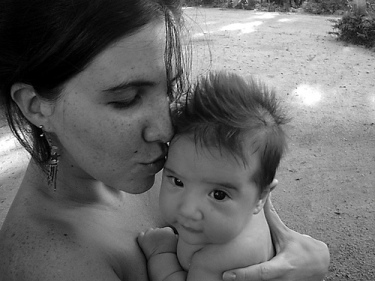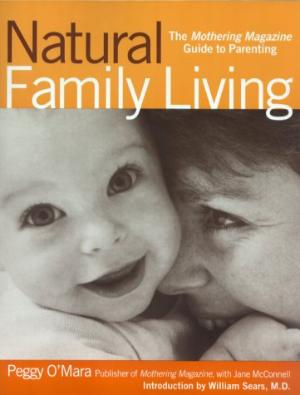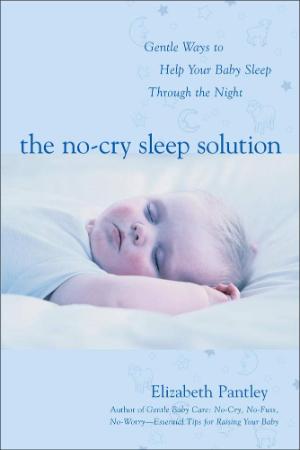
Attachment Parenting Q&A
read •

Considering Attachment Parenting but wondering about the pros and cons? Check the most frequently asked questions and see if your questions are here. You may also want to read Should I use attachment parenting?
Please note that every baby is different. Secure attachment does not develop from imposing a set of practices on your baby and yourself. It comes from staying attuned to your baby and responding to her needs. So, for instance, some babies love being in a sling, some hate it. Some don't sleep well with you, some don't sleep well without you. But all babies will communicate what works for them, if you listen. Most of all, enjoy your baby!
The questions below are some of the objections I most commonly hear to the idea of Attachment Parenting.
"Won't my baby expect to be held all the time? "
Maybe, at least in the beginning. Many babies do, unless we give them the message that we won't pick them up when they cry -- in which case they give up on having us meet their needs. Not a great start to their emotional development, and proven to lessen their ability to self-soothe as toddlers, preschoolers, and later.
"Sounds like he'll be awfully dependent on me."
Isn't that great? You and your baby will have a closer relationship, he'll learn he can depend on you, and he'll feel more secure that lions won't eat him, thus leaving him free to concentrate on age appropriate developmental tasks. Dependency is the natural state of small humans, and feeling safe is essential to early development. But don’t worry, any self respecting baby wants you to put him down well before he can crawl, so he can explore and start tearing up your house.
"But I won’t get anything done!"
That's an issue for most of us. It helps a lot to buy a sling or wrap, so you have your hands free for food shopping or folding laundry. But it helps even more if you just let go of everything on your "to-do" list that isn't essential. Just because you're home with the baby doesn't mean it's your job to handle all the household chores by yourself. Your job is the baby, and your own health and well-being. It’s true that you will have a messier house, and pasta again for supper, but carrying your child as you go about your day will have positive resonance for the rest of his or her life, while messes are temporary.
"Are you saying not to put my baby down?"
Of course not. All babies benefit from a certain amount of time to play independently, and to watch you from a safe place as you chop the onions for dinner or take a shower. Babies learn how to be alone and do their own “work” by being in your presence but not interacting, and that's an important developmental task for all babies to master.
But he can’t focus on it during a moment when he needs to be held. What I am saying is that instead of wondering why your baby won’t let you put her down, you should know that it’s better for her to be held a lot. What we expect has a lot to do with how we feel about what we get.
“I read in a magazine that babies need to learn to "self soothe,” but every time I put her down to sleep, she cries.”
The “self-soothing” argument is an outdated rationalization. Research on brain development shows that babies don’t learn to self-soothe by being put down. They learn not to depend on others because no one will come when they call.
Babies learn to self-soothe by being comforted, which teaches them not to panic, that their emotions are manageable. Being soothed when they cry actually changes the brain chemistry and neural connections so that babies learn to soothe themselves. Being left to cry changes brain chemistry and neural connections so that babies become more easily upset and less able to soothe themselves as time goes on. The amygdala actually becomes permanently enlarged. Being soothed when upset is just as important to your baby's development as being fed and diapered.
“It can’t be good for the baby to be the center of attention all the time.”
You’re right, it isn’t. Babies love to watch you go about your work from the safe vantage point of a sling or backpack, until they start creeping. That’s how they learn. Babies who are carried actually demand less attention than babies who are made to sit by themselves in strollers, seats and playpens, probably because their needs for companionship and stimulation are met at the same time.
“How do we know infants need to be held? They can’t tell us what they need.”
It’s true that infants can’t use words to tell us what they need, but their crying certainly communicates, if we listen. Only a century ago, it was thought that infants couldn’t feel pain, and operations on them were done without anesthetic. (Of course, they didn’t verbally express their discomfort, they just screamed the whole time.)
"But won’t this make my child dependent? I always wonder about parents who seem to want their kids to cling to them."
Americans are generally suspicious of dependency, in any form. We constantly give parents the message that dependency in their kids is a character flaw that’s attributable to bad parenting. But clinging is appropriate in small humans, just as in small chimpanzees.
We fill our children’s dependency needs so that, filled, they can go on to other things, like exploring the world. We acknowledge that children are children, and need our tending as they grow. Kids who’ve been attachment-parented are age-appropriate in their relationship with their parents, moving from dependency to inter-dependence, and able to form fulfilling intimate relationships as adults. When kids’ attachment needs aren’t filled, those needs eventually get focused on their peer group, often with disastrous results as they get older.
"Aren’t there experts who advise against attachment parenting?"
Probably. Our child-raising tradition owes much to John Watson, who wrote in his famous parenting book published in 1928:
"Treat them as though they were young adults…Never hug and kiss them, never let them sit on your lap. If you must, kiss them once on the forehead when they say goodnight. Shake hands with them in the morning. Give them a pat on the head if they have made an extraordinary good job of a difficult task."
Remember that Dr. Spock, in 1946, was considered a radical for suggesting that infants should be fed when they were hungry, rather than on a schedule. And only 25 years ago, daycare advocate Sandra Scarr told the New York Times that before their second year, children’s “brains are Jell-o and their memories are akin to those of decorticate rodents.” (I probably don't need to point out that babies do an enormous amount of intellectual and emotional work in their first two years, and that Scarr's comments are ridiculous.)
"But what about Ferber, who says babies need to be taught how to go to sleep by themselves?"
Many babies gradually "learn" to go to sleep by themselves. However, Ferber is right that many babies don't, because they have learned to fall asleep nursing or being rocked to sleep. These babies can indeed to be taught to go to sleep by themselves. What attachment parents take issue with is Ferber's timing -- how old should the baby be? -- and his method. There are gentle ways to teach babies this skill. Ferber is a pediatrician, not a psychologist, and no disrespect intended, but pediatricians are trained almost entirely in how to keep children's bodies healthy. They have very little training in psychological development. And he wrote his book a long time ago, before we knew so much about infant brain development.
"My baby wakes up all night long. I hate to hear him cry, but I would give anything for a full night's sleep. I am starting to resent him, and that can't be good."
You're right, the most important thing in being able to be a loving parent is that you not resent your baby. Nobody is a good parent when they're exhausted from being awakened all night long, and some babies do seem to wake up long past the time when we feel they “should be” hungry at night. (Although even toddlers have growth spurts that can make them hungry at night.) That’s because they form “sleep associations” with being nursed or rocked, so when they get to a very light stage of their sleep cycle, they wake up and need our help to go back to sleep.
But babies need to be parented at night, and it traumatizes them to be “taught” to sleep at night before they can understand what’s happening. What’s more, it traumatizes a child of any age to be left alone in the dark to cry without the comfort of a parent. When your child is old enough to learn new sleep associations (during his second year), you can stop rocking or nursing, and just comfort your child back to sleep. He may cry, but he will have the comfort of your love, and he will learn the skill of putting himself to sleep.
Elizabeth Pantley, author of the No-Cry Sleep Solution: Gentle Ways to Help Your Baby Sleep Through the Night offers a ten step plan for parents to teach their babies to sleep all night. It does involve crying, but it is definitely not "cry it out" because the parent is there to hold the child while he cries.
Does this mean that if I let my baby "cry it out" she'll be damaged for life?”
There are researchers who claim this, but I would never say that. I know many great kids whose parents used sleep training. However, we do know that babies left to "cry it out" are flooded with "stress hormones" (cortisol, adrenaline, ACTH) which destabilize their immune systems, so we know that it is bad for them biologically, at the very least. We also know that when the brain is flooded with stress hormones, we are forming panic memories. Those memories don't vanish just because the child is preverbal; researchers now suspect that such memories are instrumental in later anxiety and mood issues for some people.
Another problem is that leaving your child to "cry it out" damages not only her trust in you, but your empathy for her, so it undermines your ability to parent responsively, and that in itself is a risk factor for your child.
The impact on your child probably depends partly on her: does she learn to put herself to sleep in half an hour, or do you have to let her cry all night for a week in a row? Is this is a one-time thing, or does it have to be repeated? It is rare for Ferbering to work quickly, and parents tell me it needs to be repeated after every illness, trip, or other disruption. I personally could not imagine doing that to my beloved baby when I am doing everything else in my power to help her thrive.
Bottom line, "cry it out" sleep training gives your child messages you really don't want to give her about your love being conditional and not dependable. It isn't necessary, given that little ones can be comforted and taught new sleep associations once they can understand. So, frankly, why take the risk?
"How did societies ever evolve, with babies needing to be held all the time?"
Human babies were never meant to be taken care of solely by their mothers. In most tribal communities, babies are held by their Dads 40% of the time. In our closest primate relations, a lot of the holding is done by aunts, older siblings, and grandmothers. It really does take a village.
Most tribal people are shocked at what they see as the extreme negligence of western parents, who put their babies in bouncy seats, swings, and strollers, and make them sleep alone all night in a crib. "Don't the babies need to hear someone's heartbeat?" they ask. "Doesn't it damage their capacity to love others and feel safe in the world when they get older?"
To the degree that it damages the baby’s ability to develop a secure attachment, recent research confirms their suspicions. One might even say that our whole culture, with its focus on violence and consumerism as opposed to human connection, is an unfortunate result of what happens when children’s attachment needs are only minimally met.






